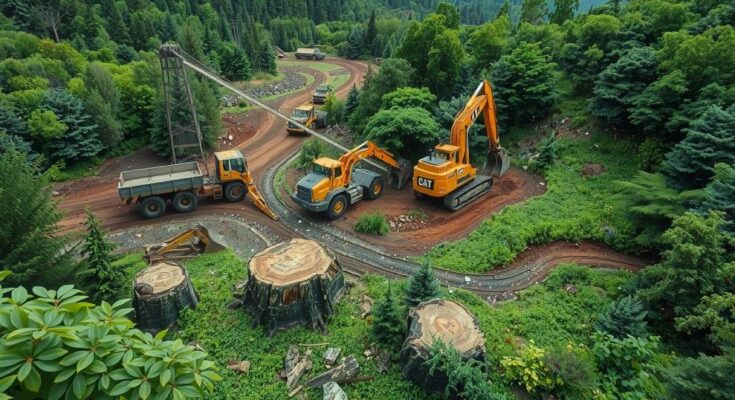Chinese mining operations are devastating the Okapi Wildlife Reserve in the Democratic Republic of Congo. Environmental degradation is rampant, as questionable boundary alterations have permitted industrial activities in protected land. Community livelihoods are disrupted, exacerbated by toxic practices and increased poaching. The situation exemplifies systemic resource extraction issues in Africa, demanding urgent global attention.
In Ituri province, Democratic Republic of Congo, the Okapi Wildlife Reserve, a UNESCO World Heritage site, faces rapid environmental devastation due to invasive Chinese mining operations. By disregarding international protections and Congolese laws, these activities are drastically altering the protected landscape along the Ituri River, turning a secure habitat for endangered wildlife into an industrial area dominated by Kimia Mining Investment.
The destruction of the reserve is facilitated by a controversial revision of its boundaries, allowing Kimia Mining to operate within the protected area. Although officials claim adherence to updated maps, the ICCN, which oversees Congo’s protected territories, insists that the original parameters should still apply. This alteration raises questions about transparency and the legality of the mining operations.
The environmental impact is profound, with former employees revealing harmful practices including the use of mercury in gold extraction, leading to poisoned water and soil. The aftermath of abandoned mining sites poses serious risks to wildlife and local communities, resulting in devastating agricultural losses that have threatened food security for farmers in the vicinity.
Okapi Wildlife Reserve, which houses a significant percentage of the remaining okapi population, confronts grave threats as mining activities expand. Concurrently, poaching activities have increased, jeopardizing the balance of local fauna and transforming a once viable hunting ground into an industrial ruin that supports neither wildlife nor local livelihoods.
The Okapi Wildlife Reserve is critical for conservation, hosting rare species and functioning as a crucial carbon sink in the Congo Basin. However, recent mining endeavors, particularly by Chinese enterprises, have highlighted systemic exploitation and environmental degradation within the region. As such projects often overlook ecological impact and local community welfare, they raise broader issues concerning international resource management and ethical practices in resource-rich countries like the DRC.
The ongoing mining activities in the Okapi Wildlife Reserve underscore the dire consequences of neglecting environmental protections in favor of resource extraction. The transformation of a once thriving ecosystem into an industrial zone exemplifies a disturbing trend in resource exploitation that compromises biodiversity and the livelihoods of local communities. The situation calls for urgent international attention and action to preserve not only the wildlife but also the cultural and economic foundations of the region.
Original Source: allafrica.com




